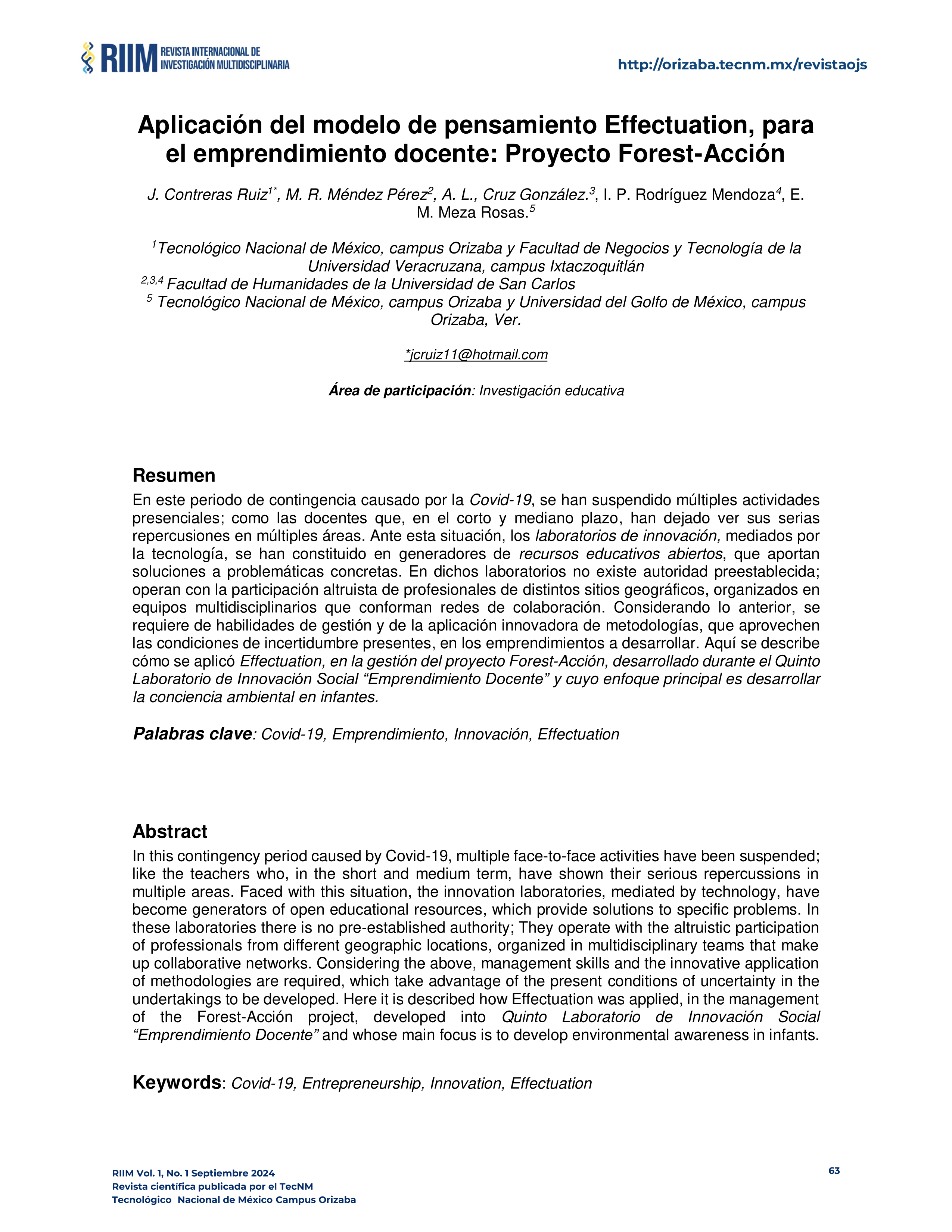Aplicación del modelo de pensamiento Effectuation, para el emprendimiento docente: Proyecto Forest-Acción
Keywords:
Entrepreneurship, Covid-19, Innovation, EffectuationAbstract
In this contingency period caused by Covid-19, multiple face-to-face activities have been suspended; like the teachers who, in the short and medium term, have shown their serious repercussions in multiple areas. Faced with this situation, the innovation laboratories, mediated by technology, have become generators of open educational resources, which provide solutions to specific problems. In these laboratories there is no pre-established authority; They operate with the altruistic participation of professionals from different geographic locations, organized in multidisciplinary teams that make up collaborative networks. Considering the above, management skills and the innovative application of methodologies are required, which take advantage of the present conditions of uncertainty in the undertakings to be developed. Here it is described how Effectuation was applied, in the management of the Forest-Acción project, developed into Quinto Laboratorio de Innovación Social
“Emprendimiento Docente” and whose main focus is to develop environmental awareness in infants.
References
BBC News (2020,03,29). Coronavirus: 5 lugares que han aplicado estrategias exitosas contra la
pandemia del covid-19. [On line] Available: https://www.bbc.com/mundo/noticias-internacional-
N. Ahmad; M. G. Hasan; R. K. Barbhuiya. “Identification and prioritization of strategies to tackle
Covid-19 outbreak: A group-BWM based MCDM approach”. Applied Soft Computing. Vol. 111,
pp. 1-13, noviembre 2021
N. Amin. “Rápido arribo de las vacunas contra la Covid-19 a nivel mundial, algunos problemas
éticos a considerar”. Vaccimonitor, vol. 30, núm. 2, pp. 47-50, junio 2021
D. Enguix; J. Aguirre; M. Sánchez; A. Hidalgo. (2020). Mutaciones, variantes y cepas de SARS-
CoV-2. [On line] Available: https://doi.org.10.1016/jsemerg.2020.12.001
IEASALC UNESCO (2020,05,13). Covid-19 y educación superior: De los efectos inmediatos al
día después. Análisis de impactos, respuestas políticas y recomendaciones. [On line] Available:
https://dialnet.unirioja.es/descarga/articulo/7502929.pdf
F. Méndez; (2021,03,18). Inequities in the emergence, manifestations and consequences of
Covid19. Colombia Médica. [On line] Available:
https://www.redalyc.org/articulo.oa?id=28366572001
R. Hernández; M. Sánchez; A. Fernández; M. Almodóvar; R. Hernández. Consideraciones
sobre la adecuación de la teoría efectual para la formación de experiencias sobre
emprendimiento. VII Congreso Internacional de Emprendimiento, 2019, pp. 1-4.
A. Da Luz.; M. Pazos; M. Tögel. “Efectos del confinamiento social, preventivo y obligatorio sobre
la salud física y psíquica de los comodorenses”. Pódium, Vol. 16, núm. 1; pp. 1-15, abril, 2021
G. Mildenberger, G. Schimpf, and J. Streicher, “Social Innovation Assessment? Reflections on
the impacts of social innovation on society - Outcomes of a systematic literature review”, epsir,
vol. 5, no. 2, pp. 1-13, Dec. 2020.
F. Bordignon. (2017). “Laboratorios de Innovación Ciudadana, espacios para el hacer digital
crítico.” Virtualidad Educación y ciencia. Vol. 8 núm. 14, pp. 165-181, mayo, 2017
M. S. Ramírez-Montoya; A. Mendoza-Domínguez; I. Sáenz-Negrete; A. Molina-Gutiérrez.
Innovación y sustentabilidad energética, Colaboración multidisciplinar, MOOC e Investigación
Educativa. ITESM, México. 2018
V. H. Guadarrama-Atrizco and A. Acosta-Long. Ecosistema de Innovación Social en México.
Foro Consultivo Científico y Tecnológico, AC. Conacyt. 2007
C. Arboleda; J. Montes; C. Correa; C. Arias. “Laboratorios de innovación social, como
estrategia para el fortalecimiento de la participación ciudadana”. Revista de Ciencias Sociales,
vol. XXV, núm. 3, pp. 130-137, julio 2019
J. A. Yáñez-Figueroa.; M. S. Ramírez-Montoya; F. J. García-Peñalvo. “Open innovation
laboratories for social modeling sustainable society sensitive to social needs”. Fourth
International Conference on Technological Ecosystems for Enhancing Multiculturality –
TEEM’16. Salamanca, España. 2016
M. Prieto.; L. Bermón; L. Ramírez. “Diseño, desarrollo y evaluación de un recurso educativo
digital para la introducción a la Administración de Sistemas Informáticos”. Revista Virtual
Universidad Católica del Norte, núm. 56, pp. 31-51, junio, 2019
J. Recio; P. Gutiérrez y G. Suárez. (2021). “Recursos Educativos Abiertos en Comunidades
Virtuales Docentes”, Apertura, Vol. 13, Núm. 1, pp.101-117, marzo, 2021
J. Campos-Stivalet. (2020, feb,28). “Effectuation o la importancia de aventurase: apuntes
sobre el paradigma emprendedor”. Entrepreneur. [On line] Available:







